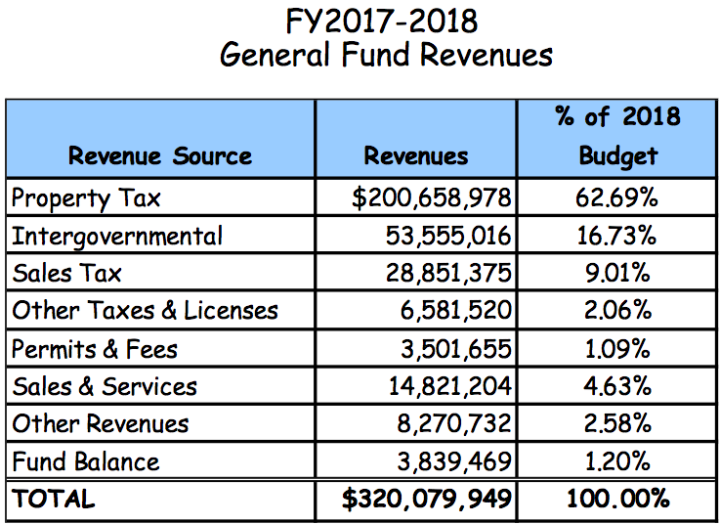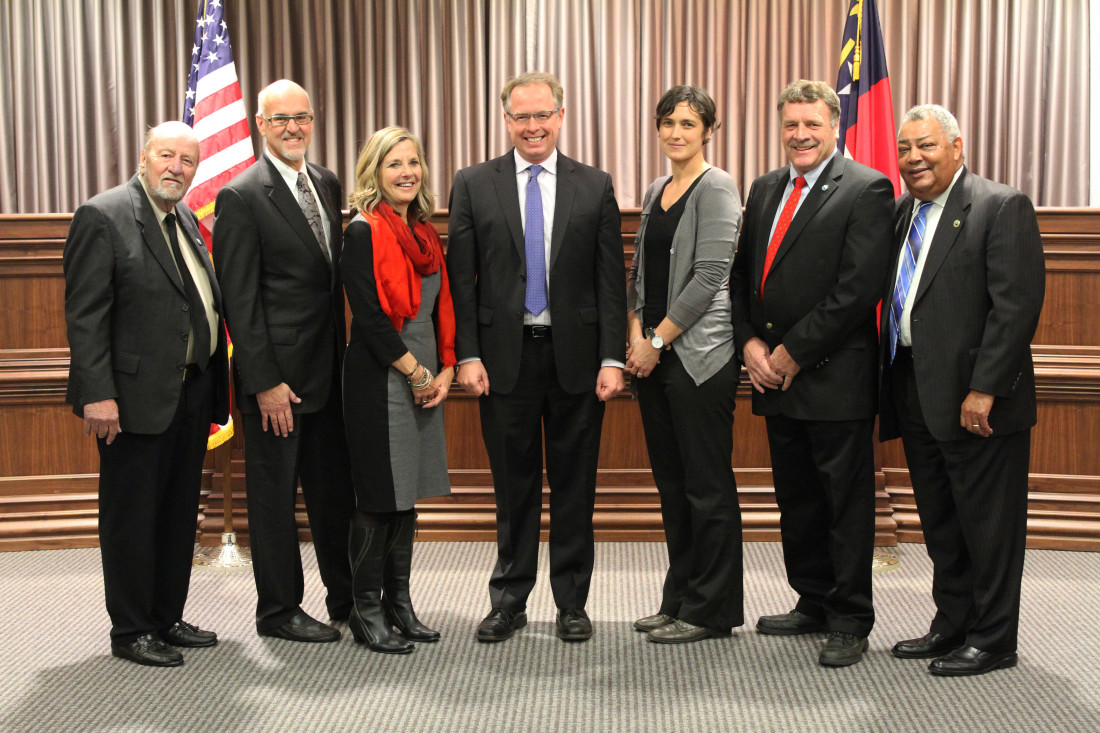The Buncombe County Board of Commissioners heard a trio of budget presentations and gave the go-ahead to one of the region’s utilities during its meeting Tuesday, May 2. Commissioners heard requests from A-B Tech and Asheville City Schools but took no action on funding amounts. Those discussions and decisions will start to take shape during a budget workshop later this month.
A pretty penny
“All revenues come from our citizens, and we are very conscious of that,” said County Manager Wanda Greene as she rolled out her proposed budget for fiscal year 2018, which starts July 1. That budget weighs in at $419,289,728, an increase of $5.7 million, or 1.4 percent, over the current budget.
“Property tax is our primary revenue and by legislative design the source we have the most control over,” said Greene. And the pool of potential revenue grew significantly as earlier this year the property revaluation reported county values increased by $6.8 billion, or 28 percent, over the last assessment in 2013. With that information, Greene is recommending that commissioners adopt a property tax rate of 55.9 cents per $100 of valued property, or $1,118 for a home valued at $200,000. While down from the current rate of 60.4 cents, it’s higher than the revenue-neutral rate of 51.3 cents, which would equal a $1,026 bill for a home valued at $200,000. “A penny is now worth $3.6 million dollars,” noted Greene.

Part of the reason for the proposed budget increase, as cited by Greene, is to make up for $6.8 million dollars spent on a 137-acre lot on Ferry Road that was purchased in a failed attempt to lure Oregeon-based Deschutes Brewery to the county. The fallout from the attempt ended with very public infighting among commissioners and still doesn’t sit well with some commissioners.
“I had concern with the purchase. I didn’t support the purchase. Wouldn’t this be a one-time impact on this budget? Let’s not make a multiyear impact to the public in our [property tax] rate,” said Commissioner Joe Belcher.
Commissioner Mike Fryar weighed in, “It’s a one-time occurrence, why are we telling taxpayers they are the one that’s going to pick up a tax increase? That’s what we are doing.”
Part of the original land deal was for the city of Asheville to pitch in $3.4 million, with the stipulation that money would go toward county public safety projects. The city has paid its amount and in return gets free use of facilities such as the county’s firing range for training and other purposes.
But Fryar still thinks the deal is a dud. “That vote, made in 15 minutes, is costing taxpayers. It’s our stupidity for doing it and buying land on an ‘if.’ We made a mistake and we need to live with it,” he said.
However, Commission Chair Brownie Newman is defending the move, insisting it will pay off in the long run. “From a budget standpoint, we don’t know when this property will sell. There is every reason to think it will sell,” he said. “At end of day, the county will have invested half of funding for that property. And if it sells for $6 or $7 million … in the grand scheme of things we are going to come out ahead to the tune of several million dollars.”
Other highlights from Greene’s budget presentation included a capital projects roundup and an explanation of how the county pays down that debt. Currently, the county has $407 million in debt, with more than half of that going toward education projects. Greene stated that 63 percent of the county’s debt will be paid off in 10 years.
“If you go out and buy a car, the payment is same every month. In government debt, they require you pay even principal payments. A government loan payment starts high and makes it way down because you pay less interest every year,” she explained. “The impact of that is, if a person buys something for $1 million, you pay $1.5 million total. The government will pay $1.4 million, or about 3 percent less. It’s a lot on multimillion-dollar [projects].”
Greene also noted the county’s infrastructure inventory is in good shape. “We don’t need a landfill, our schools are taken care of, and there’s not anything where tomorrow we would need to build it. It took about 25 years from being in horrible shape to the shape we are in today,” she said.
You can view Greene’s entire presentation here. No official action on the budget was taken. Commissioners will look to put nonprofit funding requests, the property tax rate and other budget issues under the microscope during a budget workshop on Tuesday, May 16. A public hearing on the budget is set for June 6. Commissioners have until June 30 to approve a budget.
At this rate
Asheville City Schools made its case for funding. Interim Schools Superintendent Bobbie Short asked commissioners for an increase in spending and the Asheville District Supplemental Tax. She cited new classroom size requirements, mandated by the General Assembly, as a major reason for the extra funding. According to Short, each school’s average classroom size must be 21 students per classroom, with a maximum of 24 kids per class. Next school year, she explained, that number must be an overall average of 20 students per class with a maximum of 23 kids in a class.
To that end, some of the ACS requests include:
- $288,577 for five new elementary school teachers in order to meet state-mandated class size.
- $132,623 to hire four teacher assistants.
- $385,886 for salary increases.
- $302,672 for local salary supplement increases (the current budget calls for a two-year commitment to supplement increases).
However, there is a potential, that after class sizes drop, fewer assistants will be needed, potentially evening out expenditures on faculty staffing costs.
“Bottom line, our ask is pretty simple. We are asking for 5 percent increase, and are hopeful we can have the local salary supplement,” said Short, who is also asking the ADS Tax rate be set at 13 cents. “We now are funded at 15 cents. … We’d like the 15 but would be grateful for 13. We know you will fund us as generously as you can, and we look forward to that,” she said. The lower rate is actually an increase, due to the aforementioned increase in property values.
Maintaining community
A-B Tech is also looking to grow its budget. President Dennis King started his presentation by touting the school’s enrollment and graduation numbers. Enrollment for the current school year is 22,863 students, according to King, who noted the school will be awarding 1,305 degrees, diplomas and certificates this semester alone.
King also stated the school is looking at implementing upward of 11 new programs, such as food service management, avionics and aviation mechanics. He said those potential course tracks will diversify the school’s portfolio while getting people job-ready in new industries.
King told commissioners A-B Tech is asking for $7.8 million. That’s an increase of $1.8 million over its current allotment from the county.
According to King, the county funding request would put $3.1 million toward salaries, $1.5 million for capital improvement projects and $1.7 million for utilities and preventive maintenance costs.
That maintenance is a key concern for some commissioners. “I was horrified at the state of some of those buildings. It was almost like two different worlds,” Commissioner Ellen Frost said of a recent campus tour. She said in comparison to the new Allied Health Building, “the leaking and the smell” of some other buildings was a shock. “It would be easy to point fingers and say how it got to this state,” she said while noting she is glad the school has presented a plan on how to move forward with maintenance needs.
Commissioner Al Whitesides was also impressed with the long-term plan. “I want to commend you. It’s a good, preventive maintenance plan,” he said before lamenting, “Unfortunately, we haven’t had it all along. It’s obvious for some of those buildings … there wasn’t much of a plan.”
Commissioners also requested that A-B Tech provide a list of the most popular classes based on enrollment and a breakdown of faculty and applicant diversity, an issue stemming from previous meetings concerning the current moratorium on funding capital projects with money from the bond referendum.
King told commissioners he would provide racial breakdowns immediately and get the course popularity figures to them as soon as possible.
Duke gets gas
Commissioners gave the go-ahead to a Duke Energy rezoning request. It will allow for the utility to use 23.6 acres next to its Arden facility for parking and equipment staging as it transitions the coal-fired plant into a natural gas operation.
A few nearby residents voiced concern about tree loss and traffic. Jason Walls, Duke Energy district manager, said the utility will be clearing a few trees but noted the staging area was temporary. “The company has no plans after we build the plant. We have committed to have very open dialogue as we finish the plant and leave that area … so we can leave it as a benefit to the community.”
Walls speech seemed to satisfy concerns as no other members of public voiced further issues. Commissioners did not discuss the issue before unanimously approving it.
Proclamations
Commissioners honored foster families and declared May as Motorcycle Awareness Month and YWCA-Asheville Month.

Pictured, from left, are Dr. Bobbie Short, Leslie Fay, Nona Workman, Lyndia Chiles, Beth Maczka and Ellen Frost. Photo by Lauren Weldishofer
On deck
Next up is a long day for commissioners as they hold a budget workshop at noon Tuesday, May 16. Following that, commissioners will have their regularly scheduled meeting at 5 p.m.




Before you comment
The comments section is here to provide a platform for civil dialogue on the issues we face together as a local community. Xpress is committed to offering this platform for all voices, but when the tone of the discussion gets nasty or strays off topic, we believe many people choose not to participate. Xpress editors are determined to moderate comments to ensure a constructive interchange is maintained. All comments judged not to be in keeping with the spirit of civil discourse will be removed and repeat violators will be banned. See here for our terms of service. Thank you for being part of this effort to promote respectful discussion.